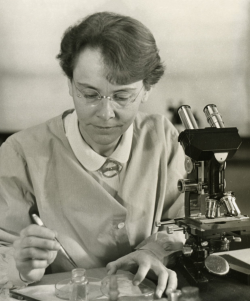Barbara McClintock

- Born
- 16 June 1902
- Died
- 2 September 1992 (age 90)
Barbara McClintock was a leading cytogeneticist and discovered ‘jumping genes’ (DNA sequences that move from one location on the genome to another). Her discovery changed the way scientists thought about genetic patterns of inheritance and helped to advance our understanding of evolution.
In 1921, McClintock was a student on the only genetics course open to undergraudates at Cornell University in New York, at a time when genetics had not gained general acceptance as a discipline. She decided at an early stage that after graduation, she would focus on cytogenetics, the study of human and animal chromosomes.
McClintock pioneered the study of the genetics of maize cells; each kernel of maize is an embryo produced from an individual fertilisation and so hundreds of offspring are produced on a single ear of corn. As a result of her research in the late 1940s to early 1950s, in which she observed the patterns of colour in maize kernels over generations of plants, she concluded that genes could move within and between chromosomes.
every person is unique, but some are more unique than others. There has never been anyone like Barbara McClintock in the world, nor will there ever be.
McClintock’s work was revolutionary as it suggested that an organism’s genome could change over time. However, this didn’t fit in with conventional thinking about genetics at the time and was largely ignored. It was only decades later, with improved molecular techniques in the 1970s and 1980s, that her theory was confirmed and mobile genetic elements, or ‘jumping genes’, were found in micro-organisms, insects and even humans. McClintock discovered what the telomere and centromere of the chromosome were for and was the first to describe how the transposition of chromosomes control which genes are expressed or turned off.
Jumping genes help to explain how bacteria can build up resistance to antibiotics, and how they play a role in some viral infections, cancer and immunology. McClintock was awarded the Nobel Prize for Physiology or Medicine in 1983, at the age of 81, for the discovery of genetic transposition. She was the first American woman to win an unshared Nobel Prize.
She was also the first scientist to speculate correctly on epigenetics, before the strucutre of DNA was established and more than 40 years before the concept of epigenetics was formally studied.



